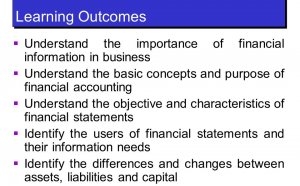
Relevance in Financial Accounting
In accounting, the term relevance means it will make a difference to a decision maker.
For example, in the decision to replace equipment that has been used for the past six years, the original cost of the equipment does not have relevance. In other words, the original cost is irrelevant or is not relevant in the decision to replace the equipment. What will have relevance are the future amounts, such as the cost of the new equipment, and the savings that will occur when the old equipment is replaced.
Here's another expression of relevance: Costs that will differ among alternatives. Costs that will not differ among alternatives do not have relevance.
In order to have relevance, accounting information must be timely. Financial statements issued three weeks after the accounting period ends will have more relevance than financial statements issued several months after the period ends. Having timeliness and relevance may mean sacrificing some precision or reliability.
Read more about relevance in paragraphs 46-57 of the Statement of Financial Accounting Concepts No. 2, Qualitative Characteristics of Accounting Information, issued by the Financial Accounting Standards Board. You may read it at no cost at
Studies show that exam questions are a great way to learn and retain important information. Gain access to our 1, 700 accounting exam questions (and answers) when you upgrade to PRO.
YOU MIGHT ALSO LIKE



Share this Post
Related posts
Journal in Financial Accounting
In accounting and bookkeeping, a journal is a record of financial transactions in order by date. A journal is often defined…
Read MoreImportance of Financial Accounting in Business
Rigorous accounting requires time and effort, but your business won t remain viable without it. Jupiterimages/Comstock/Getty…
Read More










